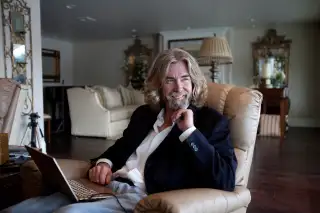The Return of the Most Interesting Man on Wall Street

Pimco, manager of nearly $2 trillion in assets and home to Bill Gross and his massive $230 billion Pimco Total Return bond fund , annouced last week that it has brought back Paul McCulley. McCulley, who made his name at the firm with his sharp commentaries on the Federal Reserve, will be Pimco's chief economist. For 100 days per year.
The return of McCulley is attracting attention in part because of recent management turmoil at Pimco, which saw former co-CEO Mohamed El-Erian clash with Gross and leave unexpectedly. Reports also mention McCulley's imaginary Q-and-A with his pet rabbit and recent unusual hair. (He's since cut it. The photo here is from 2011.)
But McCulley is also a man with unusual ideas for a Wall Streeter* (*West Coast Division—Pimco is based in Orange County). Those ideas will certainly be of interest to investors in Earth's biggest bond fund. But they also point to a different way of thinking about what the ever-mysterious Federal Reserve has been up to.
In his time away from Pimco, McCulley was chair of fellows at a group called the Global Interdependence Center, where he co-wrote a pair of unorthodox papers on the future direction of both the Fed's interest-rate setting (monetary policy, in the jargon) and government spending (fiscal policy.)
Here's the conventional wisdom on what the Fed has been doing: By holding interest rates very low, by buying up massive amounts of bonds in operations called "quantitative easing," and by communicating that it is really, really, super serious about keeping rates low until inflation runs at at least 2% and unemployment falls under 6.5%, it is sending a message to the markets. This will encourage people to buy stocks, to borrow, to invest in businesses, and to spend.
McCulley's argument (at least in early 2013 when he wrote the most recent paper) is that this is only half the game. When the private sector is still trying to climb out of a debt hole and the Fed has already cut rates near zero, the economy needs the public sector to pick up some slack. "Fiscal 'irresponsibility' (running large deficits despite large deficits as far as the eye can see) may in fact be far more important at the zero bound than monetary irresponsibility," McCulley and coauthor Zoltan Pozsar write. In their language, "irresponsibility," or unorthodoxy, is a good thing under the circumstances.
They say what the Fed has really been doing (or maybe should have been doing—it's not clear) with its extraordinary actions is to send a message to Congress and the White House: "Please, go spend some money! Even if it triggers some inflation and blows up the deficit, we won't get in your way." In fact, McCulley and Pozsar write, the central bank should have gone further, making clear it would essentially fund deficits by keeping up QE.
If that was ever the message, it was not received. In fact, the deficit has been falling, and recent battles between Congressional Republicans and the President over the debt ceiling have put an end to any talk of fiscal stimulus.
In Europe, the other big engine of the global economy, policymakers are if anything even more austerity minded.
So instead of worrying that the Fed has gone too far with QE and is about to ignite inflation, a McCulley-ish view of the world has central banks basically pushing on a string. If you believe that, you'd think the Fed's going to be keeping rates low for some time to come. And you'd probably be inclined to ignore the constant refrain that Treasury bonds, with their super low yields, are a bubble just waiting to burst.
Beyond the stock and bond markets, you'd expect sluggish growth ahead. Unemployment has dipped to 6.3%. But some worry that too much of this is due to fewer people looking for jobs.
Pimco's latest market outlook has been for a "new neutral"—that is, a world where growth and inflation never really take off in a big way, but then neither do interest rates, and investors can expect modest returns. Sounds like they've been keeping tabs on McCulley's writing and thinking. Does that mean the funds will stay bullish on bonds for a while? Maaaaybe. What a firm like Pimco says in public is one thing. They make their money by timing the turns from the status quo to the next big move. They probably won't tell you about it first. (Pimco has had a mixed—at best—record of getting interest rate and inflation moves right in recent years.)
Pimco has told its investors that a lot of the "new neutral" story is built into today's high asset prices and low bond yields. So even at face value, this isn't so much a bullish case as an argument that risks aren't as high as some people worry they are. In other words, the Pimco view is that we are not yet set up for a repeat of the 2007-2008 "Minsky moment"—a term McCulley coined for the tipping point when complacent investors discover that they took to much risk. (He's also been credited with the term "shadow banking." Like I said, interesting guy.)
Beyond what it means for Pimco's shareholders it should be interesting to see how McCulley, whose new role all but guarantees him a guest seat on CNBC and the ear of every financial reporter, affects public debate about fiscal and monetary policy. Imagine Paul Krugman sitting besides a $2 trillion portfolio.